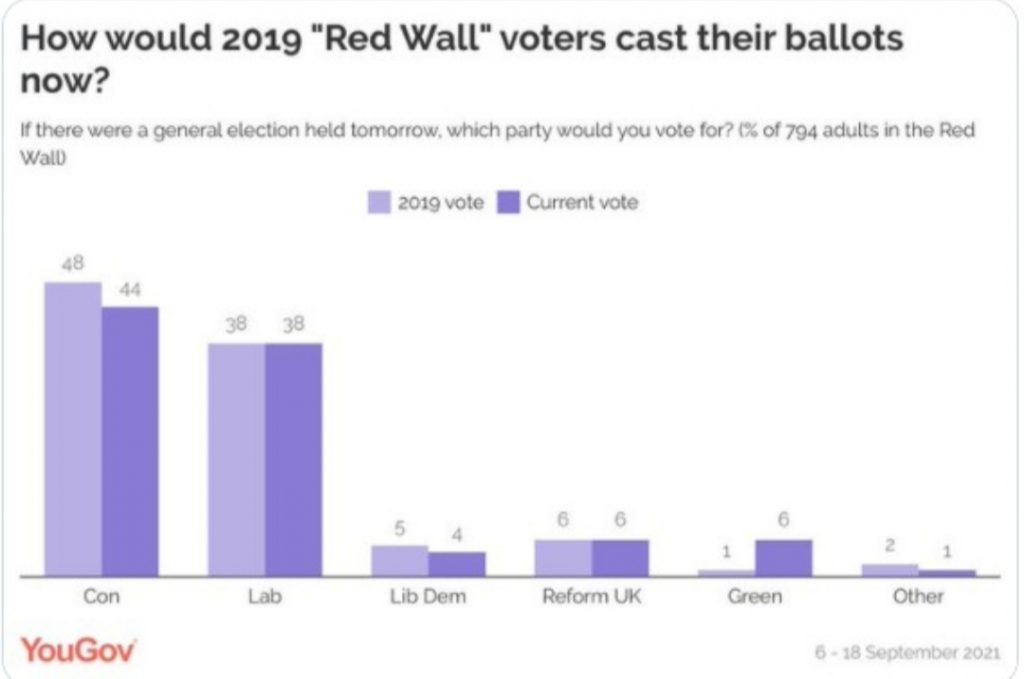Watermelons or Green perennials: Are the Greens going anywhere?

The Greens have a leadership election on, in fact they are already counting the votes. Most of the voting was online, so the winner is probably already known to the IT guy at Green Party HQ. With the official announcement waiting for the final postal votes to arrive, the leadership prospects have plenty of time to ponder: Will the Greens ever gain supporters over an election campaign?
Six months ahead of the 2019 election the Greens were polling roughly 5%, they won 2.8% (GB-wide) on election day. For 2017 they fell from around 4% to 1.7%. In 2015 it was polling of 6-7% which faded to 3.8%.
A key reason why is the tactical squeeze. The Green Party won 1 constituency in 2019, and were 2nd place in a mere 2 others. The simple truth is that, under First Past the Post, almost every vote for the Greens is a ‘wasted’ vote*.
As election campaigns heighten the focus of voters on possible Prime Ministers and governments, it is understandable that a lot of voters who ideally want a Green government end up voting for another, generally left-wing, party once election day comes.
This dynamic is a headache for the Greens, but should we count on it being a tonic for Labour? Recent polling has sometimes showed the Tories falling but Labour not rising, with other parties such as the Greens picking up instead. Some, perhaps factionally motivated, observers have wondered if this spells trouble for Labour at the next election.
I suspect it is the opposite. The Greens are highly unlikely to have a shot at winning more than one new seat at the next election and I suspect a lot of their current supporters will factor that in when voting. For Starmer, this suggests an uncomfortable but potentially wise strategy: Ignore the threat to your left flank and assume those voters will back you over Boris Johnson.
For the new Green Party leader(s) (you can run solo or as a pair), it presents a familiar and central challenge. There are really two solutions to the tactical squeeze. You can build up support in a few target areas, winning councillors and then focusing solely on a handful of seats to become viable challengers there. Or you can skip all that by simply becoming so much more popular nationally that you suddenly become viable everywhere.
The latter is obviously the more tempting, but the former is the better bet. And the Green Party members who have voted had a clear choice between the two front-running pairs. One, Omond and Womack, seek a Green revolution fuelled by associating the party with Extinction Rebellion (which Omond co-founded). The other, Denyer and Ramsey, are endorsed by Caroline Lucas and seek to professionalise the party and focus on key areas like Bristol where the party has clusters of councillors.
In fairness the the Green Dreamers, huge upsets do happen. The SNP went from modest (if higher than the Greens) support to dominating Scottish politics a decade ago and never looked back. The Lib Dems were near to jumping from a few dozen MPs to a majority if the 2010 polling is to be believed. And in Germany, where voting takes place tomorrow, the German Greens were polling in the lead a few months back despite having never previously come higher than 4th (and coming 6th last time).
However, sudden success stories are extremely rare – and aren’t obviously triggered by the groups targeting them. The SNP takeover followed the 2014 referendum. Cleggmania followed the introduction of election debates. The Greens might suddenly surge if climate change really ‘arrives’ in the minds of the voters, but pursuing that strategy probably won’t make any difference to whether it happens.
The German Greens look likely to have to settle for steady growth tomorrow. The British Greens would be wise to target the same. And Starmer, at least for now, probably has bigger things to worry about.
*I put ‘wasted’ in inverted commas because I actually dislike this characterisation and feel it is superficial. The votes don’t elect the winning MP, but that isn’t the only function of a vote. They signal to the winner, whoever that is, the priorities of those voters and can certainly influence the government anyway. UKIP won only 1 MP in 2015 with almost all of their 13% of the vote ‘wasted’ but it can hardly be said those votes had no impact on the government which was formed afterwards.
Pip Moss posts on Political Betting as Quincel. He has no bets on the outcome of the Green Leadership election. You can follow him on Twitter at @PipsFunFacts